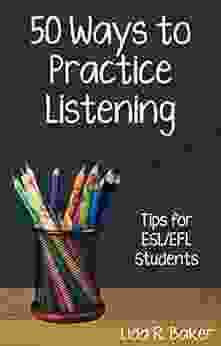Fifty Ways To Practice Listening

4 out of 5
| Language | : | English |
| File size | : | 3503 KB |
| Text-to-Speech | : | Enabled |
| Screen Reader | : | Supported |
| Enhanced typesetting | : | Enabled |
| Word Wise | : | Enabled |
| Print length | : | 35 pages |
Listening is a vital skill in both personal and professional life. It allows us to build relationships, learn new things, and resolve conflicts. Unfortunately, many of us struggle to listen effectively. We may be distracted by our own thoughts, or we may simply not be paying attention to what others are saying. This can lead to misunderstandings, hurt feelings, and even conflict.
The good news is that listening is a skill that can be learned and improved with practice. Here are fifty practical ways to practice listening:
- Make eye contact. When you're talking to someone, make eye contact with them. This shows that you're paying attention to them and that you're interested in what they're saying.
- Lean in. Leaning in slightly towards the person you're talking to shows that you're engaged in the conversation and that you're interested in what they're saying.
- Nod your head. Nodding your head shows that you're following what the other person is saying and that you agree with them.
- Ask questions. Asking questions shows that you're interested in what the other person is saying and that you want to learn more.
- Summarize what the other person has said. Summarizing what the other person has said shows that you've been paying attention and that you understand what they're talking about.
- Reflect on what the other person has said. Take a moment to reflect on what the other person has said and to think about what they mean.
- Avoid interrupting. Interrupting the other person shows that you're not interested in what they're saying and that you don't value their opinion.
- Be patient. Sometimes people need time to think before they speak. Be patient and give them the time they need to express themselves.
- Don't judge. It's important to listen to others without judgment. Everyone has their own unique perspective and experiences, and it's important to respect that.
- Be empathetic. Try to put yourself in the other person's shoes and see things from their perspective. This will help you to understand their feelings and their point of view.
- Listen for the emotional content. Pay attention to the tone of voice, body language, and facial expressions of the person you're talking to. This will help you to understand their emotions and their needs.
- Listen for the nonverbal cues. Nonverbal cues, such as body language and facial expressions, can tell you a lot about what someone is thinking and feeling.
- Listen for the unspoken words. Sometimes people don't say what they're really thinking or feeling. Pay attention to the unspoken words and try to understand what they're trying to communicate.
- Listen to yourself. Pay attention to your own thoughts and feelings as you're listening to others. This will help you to understand your own biases and to be more open to the perspectives of others.
- Practice active listening. Active listening is a technique that involves listening with your whole body and mind. It involves making eye contact, nodding your head, asking questions, and summarizing what the other person has said.
- Practice reflective listening. Reflective listening is a technique that involves listening to others and then reflecting back what you've heard. This helps to ensure that you've understood what the other person has said and that you're on the same page.
- Practice empathic listening. Empathic listening is a technique that involves listening to others with empathy and compassion. This helps you to understand their feelings and their point of view.
- Practice non-judgmental listening. Non-judgmental listening is a technique that involves listening to others without judgment or criticism. This helps you to be more open to the perspectives of others and to see things from their point of view.
- Listen to different viewpoints. It's important to listen to different viewpoints, even if you don't agree with them. This will help you to understand the world around you and to develop your own opinions.
- Listen to music. Listening to music can help you to develop your listening skills. Pay attention to the different instruments, the lyrics, and the overall mood of the music.
- Listen to podcasts. Podcasts are a great way to practice listening to different viewpoints and to learn about new topics.
- Listen to audiobooks. Audiobooks are a great way to practice listening to long-form content.
- Listen to speeches. Listening to speeches can help you to develop your listening skills and to learn about different topics.
- Listen to lectures. Listening to lectures can help you to develop your listening skills and to learn about new topics.
- Listen to sermons. Listening to sermons can help you to develop your listening skills and to learn about different topics.
- Listen to conversations. Pay attention to the conversations that you hear around you. This will help you to develop your listening skills and to learn about different topics.
- Listen to your own thoughts. Pay attention to your own thoughts and feelings. This will help you to develop your self-awareness and to understand your own needs.
- Practice listening to yourself. Record yourself speaking and then listen back to the recording. This will help you to identify areas where you can improve your listening skills.
- Get feedback from others. Ask others for feedback on your listening skills. This can help you to identify areas where you can improve.
- Be patient with yourself. Developing your listening skills takes time and practice. Be patient with yourself and keep practicing.
Listening is a vital skill in both personal and professional life. By practicing the techniques outlined in this article, you can improve your listening skills and become a more effective communicator.
4 out of 5
| Language | : | English |
| File size | : | 3503 KB |
| Text-to-Speech | : | Enabled |
| Screen Reader | : | Supported |
| Enhanced typesetting | : | Enabled |
| Word Wise | : | Enabled |
| Print length | : | 35 pages |
Do you want to contribute by writing guest posts on this blog?
Please contact us and send us a resume of previous articles that you have written.
 Top Book
Top Book Novel
Novel Fiction
Fiction Nonfiction
Nonfiction Literature
Literature Paperback
Paperback Hardcover
Hardcover E-book
E-book Audiobook
Audiobook Bestseller
Bestseller Classic
Classic Mystery
Mystery Thriller
Thriller Romance
Romance Fantasy
Fantasy Science Fiction
Science Fiction Biography
Biography Memoir
Memoir Autobiography
Autobiography Poetry
Poetry Drama
Drama Historical Fiction
Historical Fiction Self-help
Self-help Young Adult
Young Adult Childrens Books
Childrens Books Graphic Novel
Graphic Novel Anthology
Anthology Series
Series Encyclopedia
Encyclopedia Reference
Reference Guidebook
Guidebook Textbook
Textbook Workbook
Workbook Journal
Journal Diary
Diary Manuscript
Manuscript Folio
Folio Pulp Fiction
Pulp Fiction Short Stories
Short Stories Fairy Tales
Fairy Tales Fables
Fables Mythology
Mythology Philosophy
Philosophy Religion
Religion Spirituality
Spirituality Essays
Essays Critique
Critique Commentary
Commentary Glossary
Glossary Bibliography
Bibliography Index
Index Table of Contents
Table of Contents Preface
Preface Introduction
Introduction Foreword
Foreword Afterword
Afterword Appendices
Appendices Annotations
Annotations Footnotes
Footnotes Epilogue
Epilogue Prologue
Prologue Laurie Silva
Laurie Silva Timothy Rommen
Timothy Rommen Nola A Schmidt
Nola A Schmidt David Grossman
David Grossman Stephen V Geddes
Stephen V Geddes Francisco De Quevedo
Francisco De Quevedo Karel Capek
Karel Capek Guy Claxton
Guy Claxton Herman Lehmann
Herman Lehmann Mark Berry
Mark Berry Tony Bramley
Tony Bramley Abraham Cahan
Abraham Cahan Dana Laake
Dana Laake Perry Comer
Perry Comer Jonathan E Hillman
Jonathan E Hillman Lucy Tempest
Lucy Tempest Lisa Renee Jones
Lisa Renee Jones Kyra Sundance
Kyra Sundance Alexis Perella
Alexis Perella Fei Xu
Fei Xu
Light bulbAdvertise smarter! Our strategic ad space ensures maximum exposure. Reserve your spot today!

 Robin PowellExhausted on the Cross: Lucy Tempest's Poignant Depiction of Suffering and...
Robin PowellExhausted on the Cross: Lucy Tempest's Poignant Depiction of Suffering and...
 Benji PowellUnveiling the Celestial Secrets: A Comprehensive Guide to the Life and Legacy...
Benji PowellUnveiling the Celestial Secrets: A Comprehensive Guide to the Life and Legacy... Edgar HayesFollow ·8.1k
Edgar HayesFollow ·8.1k Mark TwainFollow ·13.6k
Mark TwainFollow ·13.6k VoltaireFollow ·13.7k
VoltaireFollow ·13.7k Salman RushdieFollow ·19.7k
Salman RushdieFollow ·19.7k Maurice ParkerFollow ·7.1k
Maurice ParkerFollow ·7.1k George HayesFollow ·8.2k
George HayesFollow ·8.2k Grayson BellFollow ·4.6k
Grayson BellFollow ·4.6k Alec HayesFollow ·19.6k
Alec HayesFollow ·19.6k

 Cody Blair
Cody BlairWill You Ever Pee Alone Again? The Future of Bathroom...
The bathroom has long been a place of...

 Al Foster
Al FosterNine Years Among the Indians 1870-1879: Witnessing Their...
In the annals of American...

 Pete Blair
Pete BlairYekl and the Imported Bridegroom: A Window into the New...
Abraham Cahan's Yekl and the...

 Pablo Neruda
Pablo NerudaSearch Engine Optimization Guide: A Non-Technical...
In today's digital landscape, having a...

 Nikolai Gogol
Nikolai GogolOne Piece Vol 77: Smile - The Saga Continues with...
The Enthralling World...

 Dan Henderson
Dan HendersonThree Farmers On Their Way To Dance
In a quaint countryside...
4 out of 5
| Language | : | English |
| File size | : | 3503 KB |
| Text-to-Speech | : | Enabled |
| Screen Reader | : | Supported |
| Enhanced typesetting | : | Enabled |
| Word Wise | : | Enabled |
| Print length | : | 35 pages |








